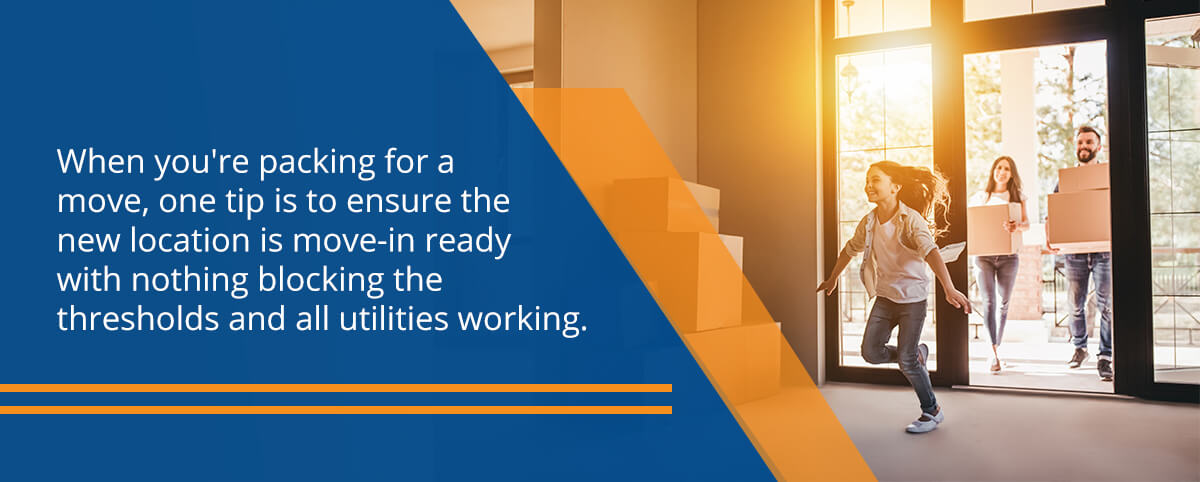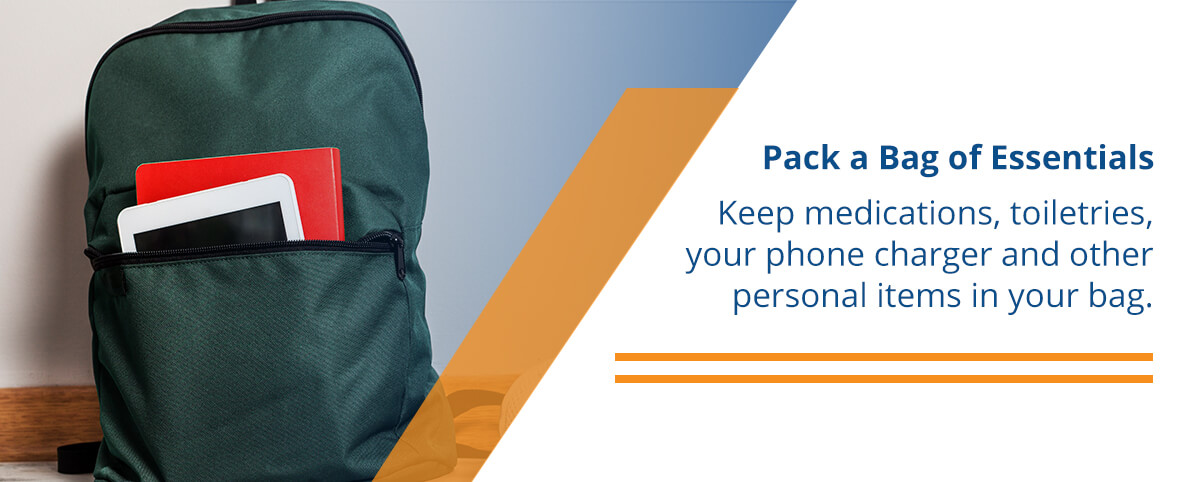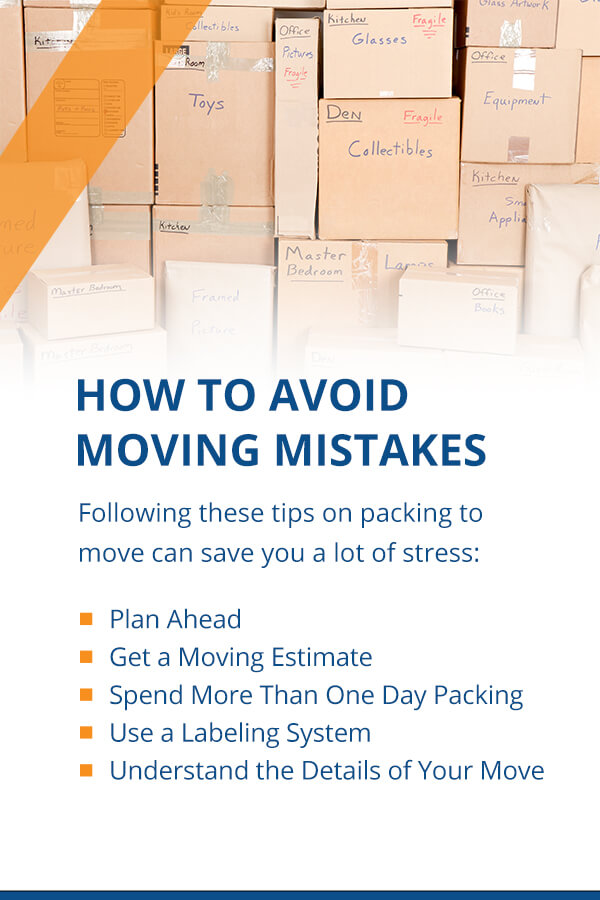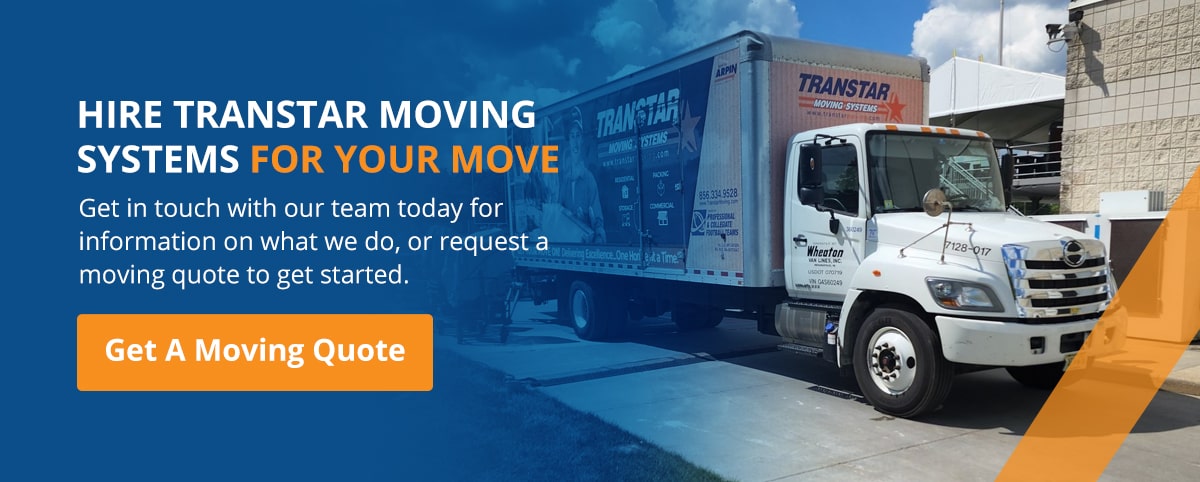Moving day creates a lot of activity at your residence or business, with your moving crew working to get your items where they need to go as quickly and efficiently as possible. With careful planning and steps to reduce potential issues, moving can be a low-stress, seamless event.
Whether you’re hiring a local company to help you move or will be unavailable to assist the movers at your old place, you can make the process easier with these tips for moving.
TIPS FOR PACKING TO MOVE WITH A PLAN
Although knowing everything to expect on your moving day is out of the question, you can still make the process much easier with a clearly thought-out plan. Each move is different and has its own challenges. Hiring a moving company takes care of most of the heavy labor, but you still need to be prepared. These moving tricks and tips are helpful if you’re planning a home or business move:
1. Make Arrangements for Child Care or Pet Care
Packing up your belongings can be more challenging when you have young children or pets to keep out of the way. It can also be stressful for animals and unsafe for curious children.
The best advice on how to pack for a move when you have kids or pets is to make sure they are out of the environment on moving day. Make arrangements for someone to care for your kids or pets. This way, you can avoid the added stress of keeping your loved ones distracted and contained while you pack.
2. Prepare Your New Location

When you’re packing for a move, one tip is to ensure the new location is move-in ready with nothing blocking the thresholds and all utilities working. Bring a measuring tape to the new place so you can make sure your furniture will fit through the doorways. This is also a good time to double-check that your key works. Taking this step will prepare you for any possible moving hurdles that may come up and it will make the process less stressful overall.
3. Make an Inventory of Your Belongings
Some moving hacks for keeping track of your stuff include labeling everything and making a list.
Your moving company will develop an inventory list to track all items that need to be transported. You should also make your own inventory list or ask for a copy of theirs.
Label the boxes you intend to use so your items are easier to find. Doing this will make unloading boxes of smaller items much easier. It’s also helpful to label your boxes with which room they should be unpacked in so your moving crew can work more efficiently.
4. Purge Items You Can Afford to Get Rid of
Of all our moving and packing tips, this is one of the most vital for making your load a reasonable size. Moving is easier when you have less stuff to transport. If you are downsizing, you will need to take this step, but purging items is always helpful for organizing your belongings — even when you’re moving to a house with larger square footage or switching to a new business location.
Here are some tips on getting rid of stuff you no longer need:
- Have a garage sale, but host it long before moving day.
- Donate the items for a tax credit.
- Give the old stuff away to your friends and family.
5. Prepare Your Appliances
If you are moving your appliances to the new location, make sure they are ready for the movers to transport with these tips for packing your appliances:
- Unplug your large appliances like ranges or ovens, disconnecting the gas if necessary.
- Empty out any stored food and clean the inside of each appliance.
- Defrost your freezer before transporting it.
- If you’re moving a washing machine or ice-maker, drain the water.
6. Be Aware of What Items Movers Can Transport
This is the best moving tip for selecting the right movers. Before you choose a moving company, ask about what their limitations are. Some companies are equipped to move your piano and heavy commercial equipment, for example, but others may lack experience in these areas.
Movers are generally unable to transport any flammable items. You should dispose of such supplies before the move or pack them in your own vehicle. Transporting combustible items could pose a hazard, which is why movers prefer that you personally deal with:
- Gasoline jugs or cans.
- Propane tanks.
- Kerosene or other types of fuel.
- Fertilizer.
- Household items like nail polish remover, batteries and cleaning products.
- Aerosol can products.
- Firearms and ammunition.
7. Get Extra Time to Pack If Needed
If you start packing early enough, you can figure out if you need more time to sort your belongings yourself before the movers arrive. You might realize that you need more time to clean or prepare before the moving date. If you give your movers enough notice, they can move your appointment or bring additional materials.
8. Coordinate Your Settlements
Ensure your settlements align when you have more than one — a settlement for both the new and old property. If you can’t close on the new property before your original moving date, prepare to stay overnight at a different location. Call your moving company to let them know if you’ll need to move your date.
9. Deep Clean Your Old Location
Moving your belongings is easier when everything is neatly organized and the location is clean and free of clutter. Cleaning tasks may seem like they should come second to packing, but you still want to prioritize them. Make a checklist to ensure you and the movers can get the job done efficiently:
- Take out the trash.
- Clean the bathroom and shower.
- Empty your refrigerator and freezer of all food and beverages.
- Clean the floor.
10. Make Time for a Meal
When you’re excited about moving, sometimes you forget to drink enough water or eat lunch. As you sort your possessions and move boxes, you will probably end up using more energy than you expected, even with the movers’ help. Here are some food tips to use when moving:
- Keep a cooler in your vehicle with snacks and plenty of bottled water.
- Pack high-protein foods that are easy to clean up for your trip to the new location.
- Make sandwiches the night before.
11. Pack a Bag of Essentials

Get out a duffle bag or suitcase that you can pack with items you will need during the move. Store your travel bag in your vehicle where you can easily access its contents.
Keep medications, toiletries, your phone charger and other personal items in your bag. It’s also a good idea to use your bag for storing smaller valuables and important documents like your Social Security card, birth certificate, bank statements and any other written items. A few changes of clothes will also come in handy, as you’ll feel tired at the end of the day.
12. Charge Your Phone
With a fully charged phone before moving day begins, you have one less thing to worry about. You will need to coordinate with your movers and your packing schedule, especially when family, friends or colleagues are helping you move. You will also need to locate the new place if you don’t yet have the address or location memorized, which your phone’s GPS technology can help with.
Plug in your phone the night before moving day and keep your charger where you can easily find it.
13. Leave Out Some Cleaning Supplies
Keep cleaning supplies like a broom and dustpan around in case you need to make touch-ups. Store your cleaning supplies in your vehicle or somewhere they can stay off the moving truck. This way, you can clean up any last-minute spots after the movers leave. You may also want to do some quick cleaning at your new place before moving all your belongings in.
14. Have Tip Money for Your Movers
Have extra money on hand so you can tip your movers. Although tips are optional, your moving team will appreciate receiving them. Cash tips are generally the only kind a company’s employees can accept.
15. Do a Final Walkthrough
Make sure the movers take everything that needs to be on the moving truck. You want to avoid leaving something behind that you expect the movers to handle. They will work from your inventory list, so double-checking it is always a good step to take.
When you do your final walkthrough with your moving crew, look for smaller items you may have forgotten about inside cabinets and drawers. Also, check any partially concealed areas like closet spaces and the back parts of your shelves.

HOW TO AVOID MOVING MISTAKES
Whether you’re moving locally or preparing to undergo a long-distance move, one of the best ways to pack for moving is to be aware of common mistakes. Following these tips on packing to move can save you a lot of stress:
1. Plan Ahead
One of the biggest mistakes you can make is assuming that your movers will organize everything for you. Although a professional moving company will certainly help you stay organized throughout the process, you want to have a plan before moving day that involves:
- Calling as early as possible: Schedule your appointment at least two weeks in advance. This way, you can get the best possible move date.
- Scheduling a move date with time to spare: Doing so gives you enough time to purge, sort and prepare your belongings for the movers. You will need to make arrangements for the move date, and you also want to have long enough to clean your old location.
- Taking it slow: If you rush through the preparation, the move will be more stressful than you expected. You might end up having concerns that you realize you should have addressed earlier, like where you should take your pets while the movers are working.
- Having a solid moving day plan: Follow the above advice about being prepared for the process of packing and moving.
2. Get a Moving Estimate
Another common mistake is making the assumption that the quote your company gave you over the phone will reflect the actual costs of the move. You always want to have an in-home estimate, which can help you find the best price and avoid scams.
Getting an accurate estimate looks like this:
- Call them for a quote: Call the company for a quote to get an idea of what you might pay. Ask about hidden costs.
- Request an in-home estimate: Once you have found the moving company you want to work with, order the in-home estimate.
- Confirm your costs: Before your moving company arrives for moving day, a representative should be able to give you an estimate on-site. Ask the representative about hidden costs as a double-check.
Avoid working with a mover who refuses to visit the property to give you a quote. Getting an in-home estimate benefits you because it:
- Helps you avoid surprise fees or issues with the size of your belongings being over the quoted estimate.
- Helps you determine what’s included in the price of moving.
The most reliable services are reasonable without being cheap, but you should know what you’re paying for, including what packing materials the movers will bring.
3. Spend More Than One Day Packing
Avoid the mistake of spending only one day trying to pack up your residence or business. Even for a small job, packing almost always takes more than one day. Start organizing your belongings for the movers at least one week in advance.
If you put off sorting your stuff until the night before, you could run into all kinds of problems on moving day.
4. Use a Labeling System
You definitely want to avoid having large piles of unlabeled clutter and various, unorganized possessions for your movers to handle. If you neatly group your items into categories and label your boxes, you can save time on moving day.
A labeling system ensures that:
- Your movers can keep track of everything.
- The contents of each box get unloaded into the rooms you intended.
- You can easily locate your belongings after moving.
- You will know if a box goes missing.
5. Understand the Details of Your Move
Be aware of important details about your mover’s insurance or other agreements you made. Reputable movers will cover losses or damages to your property, but different types of coverage are available. Some coverage is value-based, whereas others focus on the weight of your belongings.
Before the move begins, ensure you understand:
- Your company’s insurance coverage and how it applies to your belongings.
- The claim details and your mover’s liability policy.
- Any documents related to moving before you sign on.
TIPS FOR ORGANIZED MOVING
Moving can be a hassle, especially if your home and belongings are unorganized. In addition to the tips above, here are a few more suggestions to help you stay organized leading up to your move.
Tie Your Cords
Cords can easily get tangled and wrapped up when packing. To avoid having to spend time untangling your cords after moving, use twist-ties or other fasteners to wrap and secure each cable. Then, place each cord in a sandwich bag and label the bag so you can easily find and identify the cable and what it belongs to.
Pack by Room
Packing randomly will be inefficient in the long run. Pack your house room by room, starting with the spaces you use the least. For example, you may start with your guest bedroom and bathroom. While packing each room, only pack boxes with items that will be unpacked into the same space in your new house. This method keeps your belongings organized and easy to find and unpack in your new location.
Label and Color-Code
As mentioned above, labeling is an effective way to stay organized when moving. You may also color code your belongings. For example, you could use different colored tape depending on what part of the house a box should go to. This will help you and your movers pack and unpack boxes efficiently. You’ll also avoid running around your new house looking for items in random boxes.
Use up Consumables
When packing your kitchen, pantry or other areas of the house, a great way to cut back on what you need to pack is by using up or passing on any partially used consumables. In the kitchen, make a meal plan to try and use up what you already have before moving. You may also pass some consumable items, like paper products, on to friends or family rather than throwing them away before the move.
BENEFITS OF ORGANIZING FOR A MOVE
Even if organization isn’t your strong suit, you’ll be glad you did it for your move. Here are a few ways moving organization can be beneficial:
- Makes unpacking easier: The more organized you are when packing, the easier unpacking will be. Organizing while packing essentially sets you up for success after the move.
- Reduces stress during the move: Moving becomes significantly more stressful when everything is unorganized. From your belongings to your moving plan, take time to organize for your mental health.
- Eliminates clutter: As you organize, you’ll likely find items that are damaged or no longer needed. Getting rid of this stuff will eliminate clutter and make more space for the things you need and use.
HOW TO UNPACK AND ORGANIZE AFTER MOVING
After all your belongings and furniture are completely moved, it’s time to start unpacking. Staying organized after you move helps you unpack effectively and maintain a clutter-free home. Here are some tips for unpacking and organizing after moving.
Clean First
If possible, clean your new house before your belongings get moved in. Otherwise, clean before you start unpacking. Cleaning first prepares the space for your things and ensures you’re starting on the right foot in your new space.
Plan Your Spaces
To make the most of your space, plan where the furniture will go, whether it will fit and how to organize cabinets and closets. Take measurements and get moving organizers to ensure you’re making the most of available space.
Create an Unpacking Timeline
Unpacking can feel daunting. Create an unpacking timeline to help yourself stay on track. Start immediately while working at your own pace. It’s best to unpack the necessities first, like items that go in the kitchen, some clothing items and linens. Work through the house one room at a time until you’re settled in your new home.
The overall best moving advice we can give you is to find a company with an excellent reputation and the professionalism and moving capabilities your belongings require. Transtar Moving Systems can answer that call for you. We perform residential moves in Voorhees, Moorestown, Cherry Hill, Washington Township, Marlton, Philadelphia and Medford.
As trusted NJ movers, we keep up with state regulations and are registered for interstate moves to give you the best service possible. Get in touch with our team today for information on what we do, or request a moving quote to get started.

